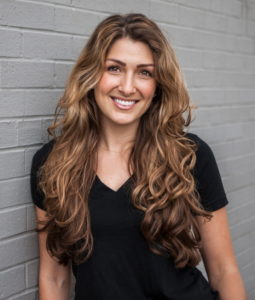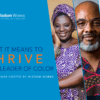With all of the worries about how millennials are changing the work world—and not for the better, some would say—it’s wonderful to talk to a powerful and insightful young woman who is both trying to set the record straight and make the world a healthier more powerful place for herself and for people everywhere. I’m talking about Alexis Jones, co-founder of I AM THAT GIRL, an empowerment non-profit helping girls transform self-doubt into self-love. Alexis is this week’s Face of Wellbeing Leadership.
I recently asked Alexis what it means for her to live and lead wellbeing. She’s the first to admit that it’s much easier to talk about self-care and wellbeing than to do it. “For as long as I can remember I’ve gained confidence and my sense of self from accomplishment—from doing more and more and more. As an example I was at a retreat this weekend preaching on self-love and self-care. Because of over-scheduling myself I was so worn out when I got done with the retreat that I had to have someone take me to the emergency room due to severe migraine,” she says. “Clearly, when it comes to wellbeing, I continue to be a work-in-progress!”
Yet even as a work-in-progress, here are a few keys Alexis has learned about living and leading wellbeing so far:
Listen to Your Body Instead of Silencing It
I’m actually starting to appreciate my body’s signals telling me to pay more attention to myself—whether I’m getting sick or I’m getting run down or having migraines. In the past I viewed those signals as so inconvenient. I’d think, I can’t deal with this; I can’t afford to be sick. Now I have such an appreciation. When I have a migraine I’m like, “Thank you, thank you, thank you body for giving me such a loud, clear signal that I’m not OK right now.”
In the past I would try to silence those signals; I would pop Advil, whatever it took. Now I listen to my body; I’m just so grateful that my body articulates its need for my attention so well.
Have a Relationship With Yourself
Very few people recognize that the relationship you have with yourself needs the same attention and work that any relationship in life requires. I would never shame a girlfriend who came up to me and said she wasn’t feeling well. I would probably say, “Of course you’re not feeling well; you’ve been working like an animal! You need to take a day off to rest, do nothing and just watch Netflix.” And, so what I’ve been working on lately is to honor that relationship with myself, knowing when I need rejuvenation. When I need to pause. When I need to be the most important thing in my life right now.
Be Vulnerable to Build a Strong Team
Leading wellbeing obviously starts with giving people permission to make self-care and wellbeing a priority in their lives, giving them space to do it, and incentivizing them. And showing people you’re doing it too, plus admitting when you haven’t done so well. In the past, when I was being “tough”—working through the pain at the retreat I mentioned—I was hurting everybody. I was sitting there telling people the most important thing is to take care of themselves yet I was obviously sick and not at my best. I was sending the message that Alexis doesn’t leave work for anything, even when she’s sick. So for me leading wellbeing is having the guts to really practice what I preach, to back my words up with actions. It means being vulnerable and admitting when my ego is driving me toward burnout. I think you build the strongest team when you can be vulnerable and take care of yourself personally.
Be Brave About Bringing Your Best Self to Work
When I work with young women I tell them that if the boss comes in and says, “I’m going to need that on my desk by the end of the day,” it’s important that they develop the courage and clarity to know what can and can’t be done. I try to coach them to say, “For me to get the amount of work done that you’re asking for, I would have to pull an all-nighter. And if I pull an all-nighter I’m not going to be the best version of myself. It’s only Tuesday so I’d be then working on fumes for the rest of the week, and I’ll be much more likely to get sick. Realistically I can have that to you in 72 hours. If you can let me have that amount of time, what I produce is going to be amazing. It’s going to be up to the standards that I know you are dedicated to.” And then do that work with a smile on your face and with tons of energy—that’s taking care of yourself, your work, and your workplace at the same time.
This Is Not Your Father’s Workplace
Mine is not a generation that’s driven by leaving work at a certain time because our TV shows are on. Our generation is based around convenience and the hours that work for us. We can watch TV any time we want on a variety of devices. We aren’t for mindlessly clocking in and clocking out. We’re more conscious of taking care of ourselves on our own schedules and not working 8-10 hours a day and hating it, like many of our parents did. We want a job that is more indicative of our lifestyle, that honors flexibility and what’s important to us. Meaning, I’m willing to work late hours if I can go to a 9 o’clock yoga session and roll into my office at 11 am. I think that’s really important for corporations to recognize that mine is a generation that’s much more outspoken about what we need to be happy and to be well. We want to inspire and be inspired. That’s when we’ll do our best work.
READ MORE
• The Art of Convening: Do You & Your Team Have Space to Transform?
• How John C. Havens Sees Technology Changing the Pursuit of Wellbeing
• The Big Questions of Living an Inspired Life (And 4 Big Answers!)
• 4 Ways to Make Wellbeing an Organizational Norm
 Renee Moorefield, PhD
Renee Moorefield, PhD
A deep and early belief that the values of health and sustainability would remake the way we live, lead, and work in the 21st century led Renee to launch Wisdom Works with her husband David Moorefield in 1999. Ever since, she’s helped forward-thinking clients—including Apollo Group, Booz Allen Hamilton, Merck & Company, Centura Health, Western Union, and The Coca-Cola Company—embed wellbeing strategies to create inspired workplaces, develop caring relationships with citizens, and produce results that matter.






